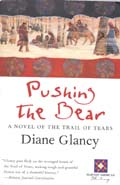Reclaiming Displaced Heritages
Online discussion of Pushing the Bear and the Trail of Tears
Students devoted many postings on their online bulletin board to Diane Glancy's Pushing the Bear, a multi-vocal narrative about the Trail of Tears. Although the instructor, Sarah Robbins, began the discussion with the posting listed below, students continued to write about the novel throughout the course.
posted by Instructor on Wed, Aug. 23, 2000, 14:35 Subject: Pushing the Bear What are some things about the way the book presents the historical events of the Removal that have changed how you feel about the Trail of Tears?
posted by Deborah Kerr on Wed, Aug. 23, 2000, 14:34 Subject: Pushing the Bear Although I have only read about 38 pages in Pushing the Bear, I am already struck by the difference way I feel about the Trail of Tears. I knew facts but I have never before read first hand accounts. This makes all the difference in how I feel now versus how I felt before Ibegan reading. I knew the Cherokee were moved against their will, but I did not realize that they were given no real warning or opportunity to even pack their belongings. This changes my previous feelings in that I am even more incensed with the treatment they received.
posted by Clinton Stringer on Wed, Aug. 23, 2000, 14:44 Subject: Pushing The Bear I have begun to read the book and am only one quarter of the way through it. What I have read so far is very disturbing, poignant, and mind-numbing. The systematic dehumanization of a people in order to gain the gold that happened to be on their land and, as an afterthought, their possessions is not an easy thing to stomach, even in a work of fiction. It is interesting to contrast the very real people who populate this story with the opinions that the "Americans" held of them. The Cherokee were all concerned with their religion, family, land, livelihood, and wellbeing. Most likely the same concerns held by those who herded these "savages" off of their land and on to another, less desirable place. I am both anticipating and dreading the rest of the book. The story's perspective is extremely insightful and interesting. History, however, has already taught us the ending. Another thing I've been thinking of: I bet many Cherokee don't claim that they are Cherokee in many instances. However, I also wonder how many people of any ethnicity claim their roots. For instance, I am mainly Irish and German with a trace of English andAmerican Indian. How many of my ancestors were extremely proud to be German during the World War? In addition, the customs and traditions of my ancestors vary greatly from my family's current customs. It seems that over time cultures get lost in some ways due to assimilation with other nations or groups of people. The world map is still changing...I wonder how many people today feel as if they are forced to change to be accepted into the global world we exist in today? This first look at a culture which I am not knowledgable about has opened my eyes greatly in more ways than any of you could ever know. There's a big picture of the world that I think many of us miss.
posted by Jessica Delk on Wed, Aug. 23, 2000, 14:53 Subject: Pushing the Bear I am so glad the instructor picked this book for us to read. Even though it is a sad and depressing book, I would rather know the truth about what was done to the Cherokee than rely on my own misguided beliefs. I always knew the removal was a terrible occurence in American History, but now I have a knew perception of what actually happened to the indians.
posted by Heather McDevitt on Mon, Sep. 11, 2000, 13:41 Subject: Pushing the Bear The image which sticks out most in my head is that of Maritole's grandmother and baby froze to death (literally) in the wagon. I could picture that image in my head so vividly that I got chill-bumps. I can't imagine having to go on an unwanted journey and finding the will to live on. I guess it must have been hard loosing so many people and in such a difficult way. I can't imagine seeing one of my relatives literally freezing to death and being incapable of doing anything to save them due to trying to survive myself and having little energy to move my own feet.Cherokee History: Links to Other Useful Websites



